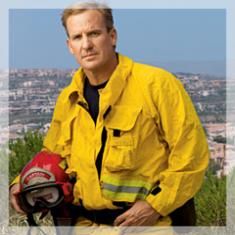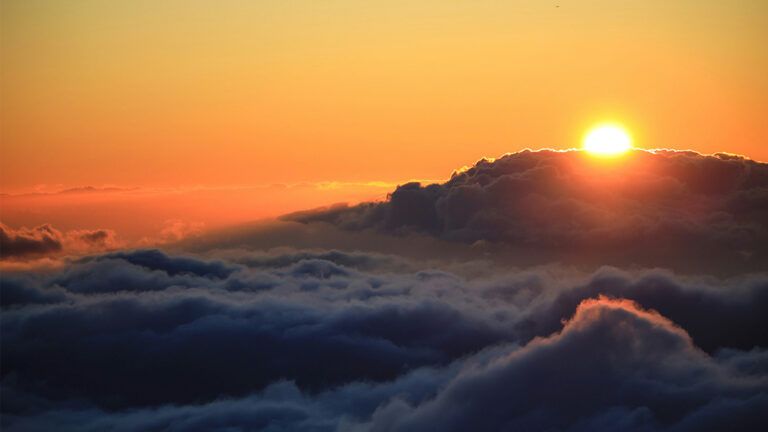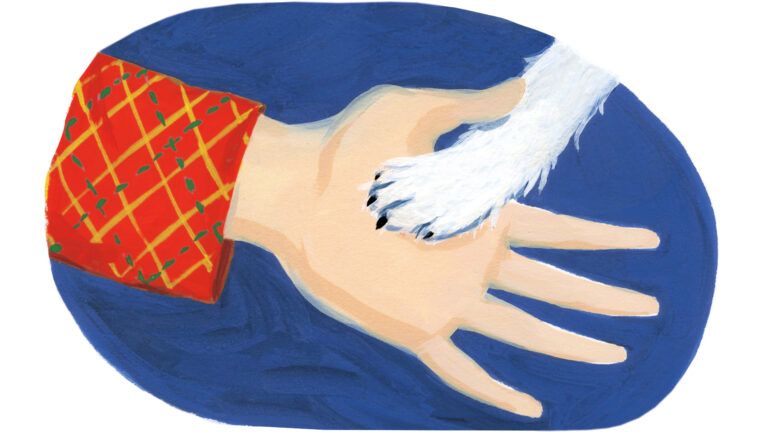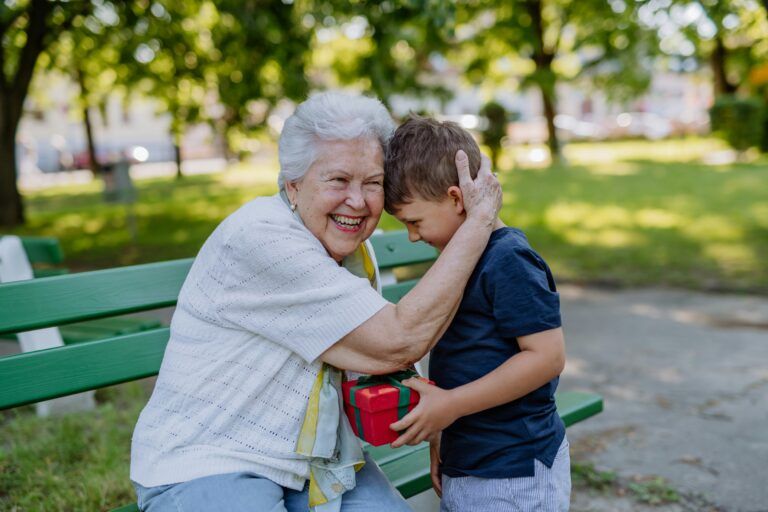Firefighters will tell you that a fire is like a living thing—a living engine of destruction. And each blaze has its own personality.
There’s a sound and smell to a wildfire that you never forget. Burning brush and searing wind roaring like a jet engine. The acrid odor of scorched earth. Then there are the trapped and smoke-poisoned firefighters hunting for any avenue of escape. It’s a world I know all too well.
I’ve battled many large blazes in my 18 years of firefighting. So I had no illusions about what was ahead when the call came last October to our Laguna Hills, California, station house.
The Santiago Fire—one of the biggest in the history of Orange County—was burning out of control. I said the prayer I always do when I jump onto the fire engine—that my Engine 22 crew and I would be safe.
We raced toward the wall of smoke and flames that towered in the hills above us. Instinctively, I patted the shoebox-size pack hanging from my belt. Inside was an emergency fire shelter, a one-man fireproof tent lined with epoxy fiberglass. Every firefighter working the brush is required to carry one. It’s a last resort when fire overwhelms you and there’s no hope of escape. You pray you never have to use it.
We made our first stand in a residential area near the city of Irvine. For 23 hours straight we fought alongside other emergency units to keep a spur of the fire from destroying a neighborhood. Then the wind shifted.
“Redeploy to Santiago Canyon Road,” the strike team leader ordered. “Do not let the fire cross that road!” We got there quickly. I had only one reaction: horror. Santiago Canyon Road zigzagged through a hilly canyon of oak trees, eucalyptus and six-foot-high native grasses and bushes.
Drought had turned everything to tinder. Fifty-mile-per-hour winds whipped the air. On one side of the road waves of fire—high as the biggest ocean waves—swept down a hill, the wind working with us, keeping the fire from the road. Then the 30-foot-high eucalyptus trees across the way caught fire. It looked as if hell itself were rising up through the earth.
I looked down the other side of the road. A few miles away nestled three tiny rural communities—Silverado Canyon, Williams Canyon and Modjeska Canyon. Families lived in those areas, people like my wife, Becky, and our three children. A chill went through me despite the scorching wind that blew from the flames.
“If the fire crosses the road,” the strike team leader’s voice crackled over my radio, “there’s nothing to stop it from destroying those communities.”
I eyed the Engine 22 crew. For a split second I wondered if we’d ever get this thing under control. Conditions were horrible. Was I putting my men’s lives at risk? Suddenly, the wind changed and shot cinders of sparks across the road. One of them caught and started to grow.
“Get a hose going!” I shouted. I heard other captains yelling the same thing. My men and eight firefighters from other companies raced a fire hose up the hill, trying to outrun the flames. But the wind kept hurling the fire forward, just out of reach. “Keep going!” I shouted. The men pushed like crazy. They were within a few feet of the fire, ready to hose it down. Water started coursing toward the nozzle.
Then, suddenly, the hose gave out. Ruptured, probably by a rock. The fire leaped forward. “Get another hose!” I yelled.
The men raced back down the hill, connected a new hose to the water tank in the fire engine and dragged it uphill—hot, exhausting work. “Give us water,” I radioed the engineer on the fire engine. Another hot ember flew like a rocket and landed right on the hose, bursting it. Water gushed on the ground.
We were almost out of weapons. Flames leaped ever higher, and the fire grew and spread before our eyes. We would have to evacuate.
The radio crackled. It was the strike team leader. “There’s a spot fire below you and it’s growing,” he warned. “We can’t put it out. Move the men into the burn. Get into the black.”
We were trapped. We couldn’t get back to the fire engine. The only possibility was to move forward up the hill into “the black,” an area that had already burned, where no more fuel for a fire remained. In theory, that was supposed to create a safe zone. But nothing is safe in a superheated gale-force wind. I was the most senior of the four captains on the hill. “Get into the black!” I ordered the men.
The black zone was at the top of a second hill, a ragged patch of earth maybe 50 feet by 20 feet beyond which flames still burned. It was like walking on hot kindling. All that protruded were a few charred tree stumps.
I radioed the strike team leader, down below. “We’re in the black.”
I kept the radio on. I heard the strike team leader conveying our situation to the command center. “Can you get a helicopter over here?” he asked. Fire Service helicopters carry tanks of water to douse wildfires from above. “These guys are surrounded.”
A voice came on through the crackle. “Negative, we do not have air support available.” That didn’t surprise me. With wildfires raging over thousands of acres, resources were stretched thin. And the ferocious wind made flying in the canyons almost suicidal. It dawned on me: We’d have to battle this one on our own. Alone.
“Twenty-two, what is your current situation?” the strike team leader radioed.
Another captain took the receiver.
“It’s getting small up here,” he replied.
We eyed the men—men who were looking to us for direction. “We’re getting ready to deploy the shelters,” he said.
That’s the most chilling message a firefighter could ever send, the equivalent of Mayday. Just saying those words sent a bolt of fear through me. Always, there had been help at the ready in the wildfires I’d fought. Men. Equipment. Helicopters to drop tons of water to open an emergency escape route for trapped firefighters like us. Not this time. The winds were so fierce, they blew the flames horizontally.
“Get into your shelters,” I ordered. The men stared at me. Never in the history of the county had anyone given such an order. “Get into your shelters!” I repeated. The men unfolded their tents and crawled inside. Then I did the same.
I listened to the radio chatter. The chief at the command center knew our situation. No help was coming. “We have deployed shelters,” I radioed. “Everyone in shelters.”
I stretched out on the ground and willed myself to remain calm. I knew we weren’t totally safe. Nothing can fully protect you from the fury of a major wildfire. Firefighters in other states had died when their shelters were overwhelmed by flames, or had suffered severe burns.
All we could do was wait. And pray. I thought of Becky and our kids, Hanna, Delanie and Hayden. I thought of the choices I’d made. I believe we were put on earth to help others. I left a good job in sales to do this. But then, to me, being a firefighter was one of the highest callings in life.
All around me I could hear the crackling fire. I grasped the interior walls with both hands to keep the heat from coming up under the tent. The heat grew intense, almost unbearable, like an oven. Literally, that was what my tent had become. Lord, I prayed, I’ve done all I can. There was nothing more. I could only trust.
At that moment a peace settled over me. The peace of knowing that whatever happened to me, I was in God’s hands. And no matter what, in God’s hands I would always be safe.
Minutes passed. The very air around me seemed about to explode. I buried my face in my arm, trying to shield it. Once more I thought of my wife and children, and prayed I’d see them again. I waited for the flames to swallow me. Then the radio crackled to life. “Here comes your drop,” the strike team leader said. My heart pounded. Could it be? I listened hard. The wind had slowed. Was it safe for choppers to fly?
Whap-whap-whap. I could hear a helicopter approach. Then, a great whoosh. Tons of water dropped down on the hillside. The air went silent. Where fire had roared, now there was only a damp hiss.
From below I could hear the sound of chainsaws starting up. Fire crews were on their way, cutting a path through fallen trees toward us. I waited a few minutes, then peeked out of my shelter. A corridor was carved down the hill. The flames blocking our exit had all disappeared. One by one, the men emerged from their shelters. All were okay. No one had been injured.
The men and I staggered down the hill. Safe. We were safe. I wanted to laugh, to celebrate, to call home just to hear Becky’s voice, and the kids. But there wasn’t time. The fire still raged and the wind had returned. There was more work to do—for my crew and the more than 1,000 other firefighters battling the blaze.
The Santiago Fire would continue to burn for almost three weeks, destroying more than 28,000 acres. Yet I was ready to face the battles ahead, with renewed trust. We weren’t alone in our fight. A power greater than the flames, a power behind the wind, was with us, protecting us no matter what.





